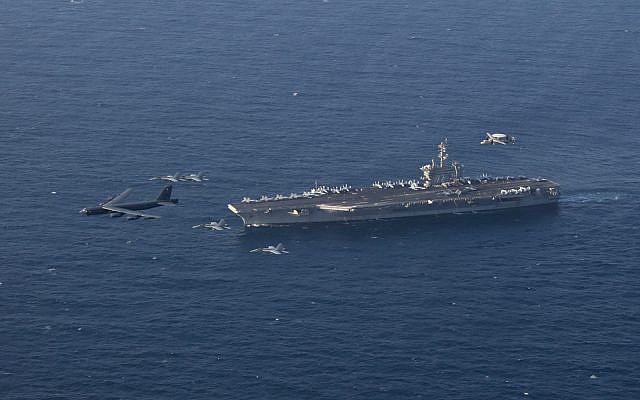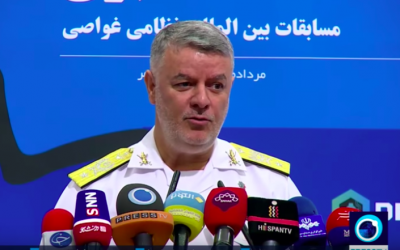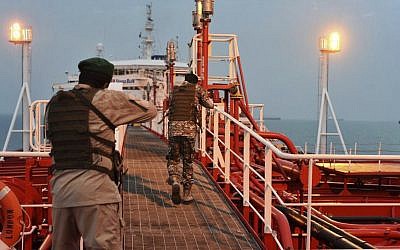Head of navy says drones tracking all ‘enemy’ vessels in the region, announces joint naval exercises with ‘allied countries’ in March 2020

The head of Iran’s navy said Tuesday that Tehran is observing all US ships in the Gulf region and keeps an archive of their movements.
“We observe all enemy ships, particularly (those of) America, point-by-point from their origin until the moment they enter the region,” Rear Admiral Hossein Khanzadi said, according to a report on Iran’s Young Journalists news site, cited by Reuters.
“We have complete images and a large archive of the daily and moment-by-moment traffic of the coalition forces and America,” Khandazi added, noting that the images of the vessels were captured using drones.
The senior naval officer also said that Iran will hold joint naval exercises with “allied countries” for the first time in March 2020, without specifying which nations would take part in the exercises.
Khandazi’s statement came amid elevated tensions in the Gulf after Iranian authorities seized a British-flagged tanker there on Friday.
British Foreign Secretary Jeremy Hunt on Monday said the UK wanted to establish a European-led maritime protection force for the Gulf but emphasized that London was not seeking a confrontation.
“We will now seek to put together a European-led maritime protection mission to support the safe passage of both crew and cargo in this vital region,” Hunt told parliament.
“We will seek to establish this mission as quickly as possible,” he said, adding: “It will not be part of the US maximum pressure policy on Iran.”

Hunt described Friday’s incident as an act of “state piracy.”
Hunt also said that a British warship, HMS Duncan, that is being dispatched to the region, would arrive by July 29, joining the HMS Montrose currently in the Gulf.
According to the foreign secretary, all British-flagged ships would be asked to give the British authorities notice when they plan to pass through the Strait of Hormuz, where Friday’s incident happened, “to enable us to offer the best protection we can.”
But he added: “It is, of course, not possible for the Royal Navy to provide escorts for every single ship or indeed eliminate all risks of piracy.”
Iran released new video showing the ship’s crew for the first time on Monday, an apparent attempt to show they were unharmed. None of the 23 are British nationals. The crew is mostly Indian, and also includes Filipino, Russian and Latvian nationals.
Friday’s seizure of the Stena Impero came amid already heightened tensions between the US and Iran stemming from US President Donald Trump’s decision last year to pull the US from Iran’s nuclear accord with world powers and reinstate sweeping sanctions on Iran.
Iranian officials say the seizure of the British oil tanker was a justified response to the Royal Navy’s role impounding its Grace 1 supertanker with some 2 million barrels of crude off the coast of Gibraltar, a British overseas territory located on the southern tip of Spain.
Iran’s government spokesman Ali Rabiei said Monday that there are diplomatic solutions to the current crisis, but he also defended Iran’s actions.
“When you illegally seize a ship in Gibraltar… we don’t deem it as necessary to show tolerance,” he said. “Some countries have asked for the immediate release of the British tanker. Well, we ask those countries to make the same request to Britain first.”

Britain says it acted lawfully off the Gibraltar coast to prevent illegal oil shipments to Syria that would have violated European Union sanctions while Iran broke international maritime law by forcing the Stena Impero to change course and go to Iran.
Britain says the tanker was in Omani waters at the time, which Iran disputes.
As the nuclear deal between Tehran and world powers unravels, the US has expanded its military presence in the region, while Iran has begun openly exceeding the uranium enrichment levels set in the accord to try to pressure Europe into alleviating the pain caused by the sanctions.
European nations are trying to save the nuclear deal and have tried to come up with ways to keep trading with Iran but have run smack into Trump’s sanctions, which also target Iranian oil exports.
As reported by The Times of Israel
